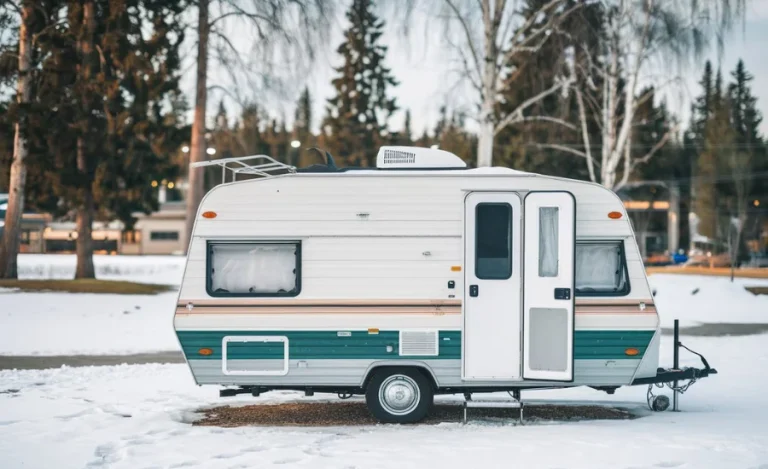Can neosporin be stored in camper over winter in pa, As winter approaches in Pennsylvania, camper owners often face the challenge of storing essential items like Neosporin. With temperatures regularly dipping below freezing, it’s crucial to consider how these conditions might impact your medical supplies.
In this guide, we will examine the feasibility of keeping Neosporin in a camper during the cold months, discussing potential risks and best practices for maintaining the integrity of your products. Additionally, we’ll highlight important considerations for RV owners, ensuring you’re well-equipped to handle the challenges posed by winter in Pennsylvania.
Neosporin, like many over-the-counter medications, has specific storage requirements. Exposure to extreme temperatures can affect its effectiveness. It’s essential to recognize that freezing temperatures can alter the composition of the ointment, potentially diminishing its ability to prevent infection.
Understanding Neosporin and Its Storage Needs
Before we dive into whether Neosporin can safely be stored in a camper during Pennsylvania’s winter months, it’s important to recognize what Neosporin is and its recommended storage conditions. This popular over-the-counter antibiotic ointment is commonly used to treat minor burns, cuts, and infections. Like many medications, it has specific storage guidelines to ensure its effectiveness.
Neosporin is best kept at room temperature, ideally between 59°F and 77°F (15°C to 25°C). It should be protected from extreme heat, moisture, and cold. But what happens when Pennsylvania’s winter temperatures plunge? Let’s take a closer look.
Best Practices for Storage
To preserve the efficacy of Neosporin during winter, consider the following strategies:
- Temperature Regulation: If possible, store your camper in a climate-controlled environment to shield it from extreme cold.
- Insulated Storage: Use insulated containers for your medical supplies, which can help protect them from temperature fluctuations.
- Regular Checks: Periodically inspect your camper and its contents throughout the winter to ensure everything remains in good condition.
Preparing for Winter in Your RV
As a camper owner in Pennsylvania, being proactive about winterization is vital. Beyond medical supplies, ensure that all aspects of your RV are prepared for the colder months. From plumbing systems to batteries, a comprehensive approach can help prevent damage and ensure a smoother transition into spring.
By taking these precautions, you can safeguard your Neosporin and other essentials, ensuring they remain effective when you need them most.
Is Winter Storage of Neosporin Safe in Your Camper?
When considering whether Neosporin can be stored in a camper throughout the winter in Pennsylvania, the answer hinges on the conditions inside the camper. Neosporin is a topical antibiotic ointment that is best stored at room temperature, specifically between 68°F and 77°F (20°C to 25°C). However, Pennsylvania winters can see temperatures drop well below freezing, particularly in December, January, and February.
Extreme cold can adversely affect Neosporin’s active ingredients. If the ointment freezes, it may become solidified or separate, compromising its effectiveness. In some cases, this could even render the product unusable. Therefore, without proper temperature control, storing Neosporin in a camper during winter poses a risk to the medication’s integrity.
Winter Storage of Neosporin in Pennsylvania Campers
When addressing whether Neosporin can be safely stored in a camper during Pennsylvania’s winter, it’s important to take the state’s harsh climate into account. Pennsylvania winters are characterized by frigid temperatures that often dip below freezing, with some regions experiencing lows around 20°F or even colder during severe cold spells.
Storing Neosporin in a camper during these winter months exposes the ointment to potentially damaging conditions. Freezing temperatures can alter the composition of the product, raising concerns about its effectiveness. This leads us to consider how exposure to cold may affect Neosporin and whether it remains reliable after being subjected to such environments.
Effects of Freezing on Neosporin
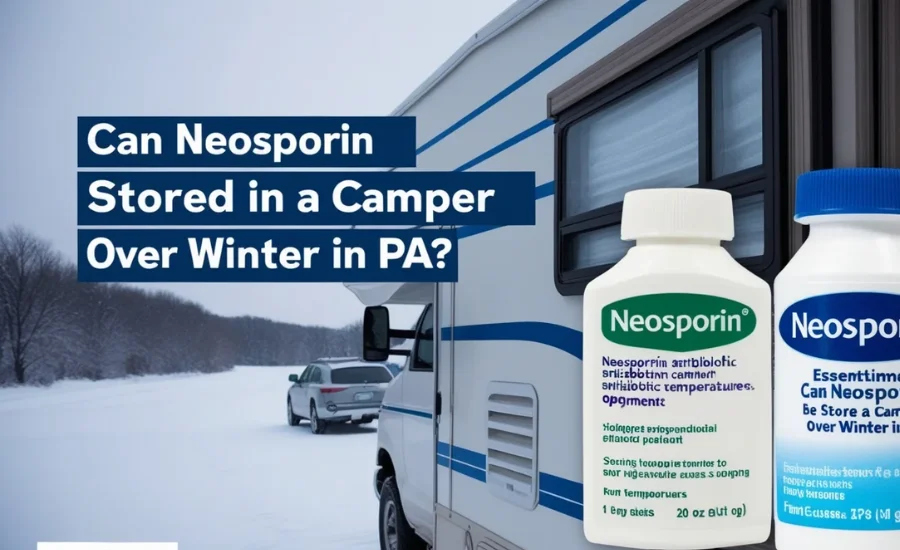
Freezing temperatures can significantly affect many medications, particularly ointments and liquids like Neosporin. When exposed to cold, the chemical structure of this antibiotic ointment may change, leading to reduced effectiveness. Although it might appear normal after thawing, the active ingredients may no longer function as intended.
Neosporin contains key antibiotics: bacitracin, neomycin, and polymyxin B, all of which are sensitive to temperature fluctuations. If these ingredients freeze, their properties can deteriorate, rendering the ointment less effective in treating infections. Therefore, storing Neosporin in a camper during Pennsylvania’s winter, without adequate temperature control, is not recommended.
Impact of Freezing on Neosporin Storage
If you’re wondering, Can neosporin be stored in camper over winter in pa it’s essential to consider how freezing temperatures affect the ointment. Exposure to extreme cold can lead to the separation of Neosporin’s ingredients, which may alter its texture and make it more challenging to apply. This separation can also diminish its effectiveness in treating infections.
While the manufacturer doesn’t explicitly warn against freezing, storing Neosporin in frigid conditions is generally not advisable. The integrity of the medication could be compromised, resulting in reduced efficacy when you need it most. Therefore, keeping Neosporin in a camper during Pennsylvania’s winter months might not be the best choice if temperatures inside the camper drop significantly.
Tips for Safely Storing Neosporin in Your Camper
If you plan to store items in your camper over the winter in Pennsylvania, especially given the frequent freezing temperatures, it’s crucial to take protective measures. Since you may be wondering, Can neosporin be stored in camper over winter in pa it’s important to know that it can only be stored safely if the internal temperature is regulated. Here are some effective strategies to safeguard your medical supplies.
Using insulated containers is one option. These storage solutions help maintain a consistent temperature for Neosporin and other sensitive products, offering protection against temperature drops. However, keep in mind that they may not be fully effective if the camper is exposed to prolonged extreme cold.
Another approach is to consider climate-controlled storage. Many RV owners opt for climate-controlled options designed to keep temperatures stable throughout the winter. This is ideal for preserving sensitive items like Neosporin, allowing you to store it safely within the recommended temperature range.
For a more straightforward solution, you might also think about removing medications before winter. Instead of relying on the question, Can neosporin be stored in camper over winter in pa taking these items indoors where temperatures are stable ensures their effectiveness is preserved throughout the season.
By following these guidelines, you can help ensure that your medical supplies remain safe and effective during Pennsylvania’s winter months.
Protecting Neosporin from Freezing in Your Camper
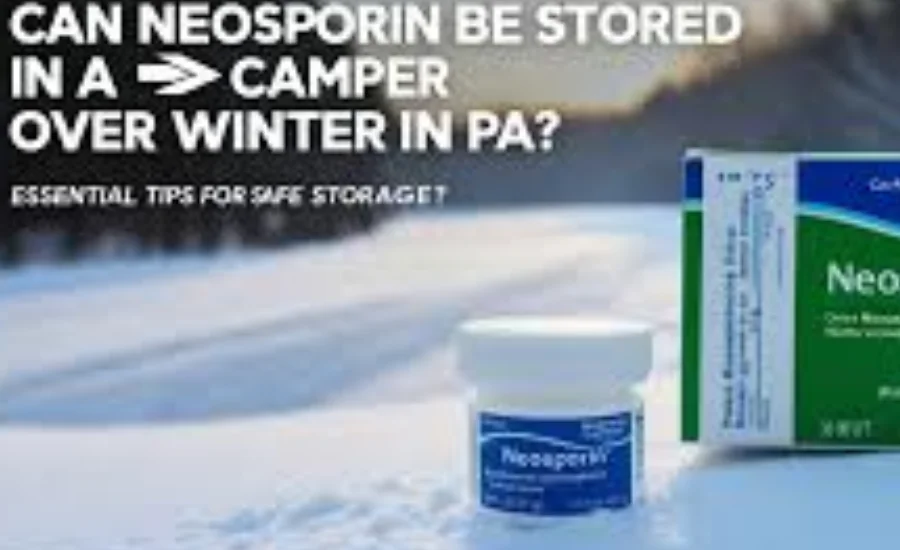
If you’re considering leaving Neosporin in your camper during the winter months, it’s important to take steps to mitigate the effects of freezing temperatures. While we’ve highlighted the potential risks, there are effective ways to safeguard your medications from extreme cold.
One effective method is to use an insulated storage box inside your camper. This can help maintain a more stable temperature for Neosporin, offering some protection against freezing. Additionally, if your camper has a small heater or you visit regularly, maintaining a low heat source can prevent medications from freezing, although this might not be practical for everyone.
For optimal safety, consider storing Neosporin in a temperature-controlled environment. Bringing it indoors will help ensure its effectiveness, particularly during harsh winter weather.
Finally, if you decide to keep any medications in your camper, consider using a thermometer to monitor the internal temperature. This will allow you to ensure that conditions remain safe for storing sensitive items like Neosporin.
By taking these precautions, you can help protect your medical supplies and ensure they remain effective throughout the winter season.
Can You Store Neosporin in a Camper During Pennsylvania Winters?
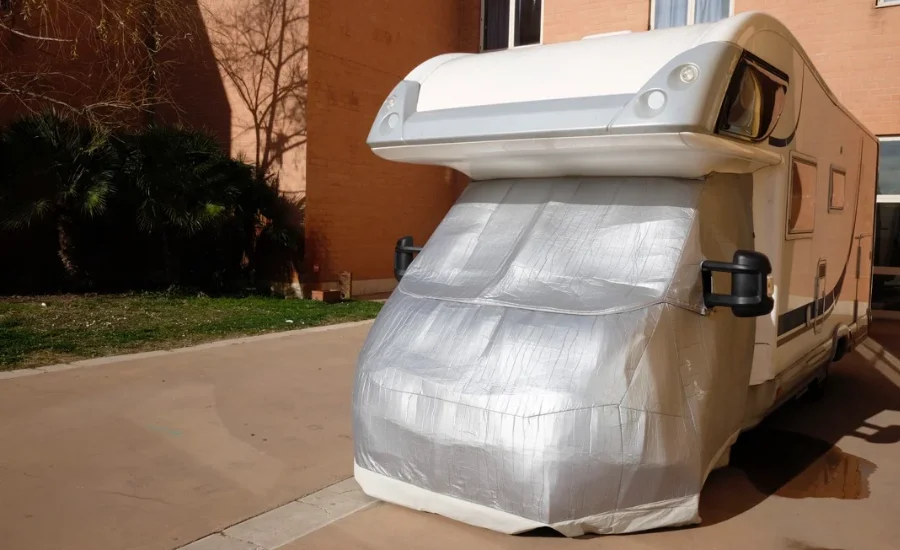
When it comes to storing Neosporin in a camper over winter in Pennsylvania, the potential risks of freezing temperatures are significant enough that it is generally not advised. Exposure to freezing conditions can compromise the ointment’s effectiveness, which may increase the risk of infection when applied to cuts or wounds.
Neosporin’s antibiotic properties can degrade if it is not stored properly, meaning it might not offer the protection against bacteria that you expect. If there’s any doubt about the integrity of the product after exposure to cold, it’s best to err on the side of caution and replace it with a new tube. Prioritizing the effectiveness of your medical supplies is crucial for your health and safety.
Essential Winterization Tips for Your Camper
In addition to the question of whether Neosporin can be stored in a camper during Pennsylvania’s winter, it’s important to take several crucial steps to ensure your camper and its contents remain safe through the harsh season.
One of the first things to address is the water system. Freezing temperatures can wreak havoc on pipes and tanks, so it’s essential to drain all water from your system and add non-toxic RV antifreeze to prevent freezing and potential damage.
Another important measure is to invest in a high-quality, breathable RV cover specifically designed for winter conditions. This will shield your camper from snow, ice, and moisture, significantly reducing the risk of mold and mildew growth.
To combat moisture buildup inside the camper, consider using products like DampRid or a dehumidifier. Keeping the interior dry is vital, and proper ventilation can also help; leaving a small opening in the roof vent can promote air circulation.
Finally, be mindful of potential rodent intrusions. Rodents seek warm places during winter, and your camper could become an attractive shelter. Seal any openings and remove food items to deter them. Utilizing traps or natural deterrents like peppermint oil can also help keep these pests at bay.
By following these winterization tips, you can protect your camper and ensure it stays in top condition throughout the cold months.
Storing Neosporin During Winter Camping in Pennsylvania
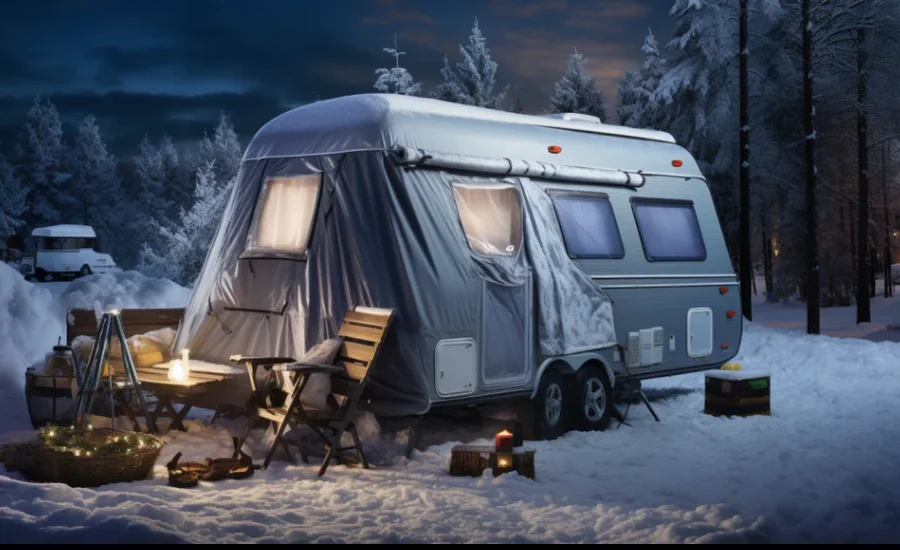
If you frequently travel or camp during the winter months, you might be asking yourself, Can neosporin be stored in camper over winter in pa While leaving it in your camper may seem convenient, there are alternative solutions to consider.
One option is to use portable medication storage bags designed to maintain a consistent temperature, even in harsh weather conditions. These compact and easy-to-carry bags provide an effective way to keep Neosporin safe during your winter camping trips.
Another approach is to stock fresh supplies just before your winter excursions. Instead of asking, Can neosporin be stored in camper over winter in pa and risking its effectiveness, consider restocking before each trip to ensure that all your products, including Neosporin, remain effective and free from the risk of degradation due to freezing temperatures.
By utilizing these strategies, you can better protect your medications and ensure they are ready for use when you need them most.
Also Read: Alejandra Sadel Carrera Highland Hospital
Final Words
If you’re wondering, “Can Neosporin be stored in a camper over winter in PA?” the answer hinges on how well you can manage the internal temperature. Pennsylvania’s harsh winter conditions can pose significant risks to medications like Neosporin. Extreme cold can compromise the ointment’s effectiveness, potentially leading to a higher risk of infection when applied to cuts or wounds.
To protect your supplies, consider using insulated storage containers or opting for climate-controlled storage options. Alternatively, for peace of mind, it’s wise to remove Neosporin and other medications before winter sets in and store them indoors. By taking these precautions, you can ensure that your medical supplies remain safe and effective throughout the cold months, allowing you to focus on enjoying your winter adventures without worry.
Fuel your curiosity—find more articles at Celebz Wave.

